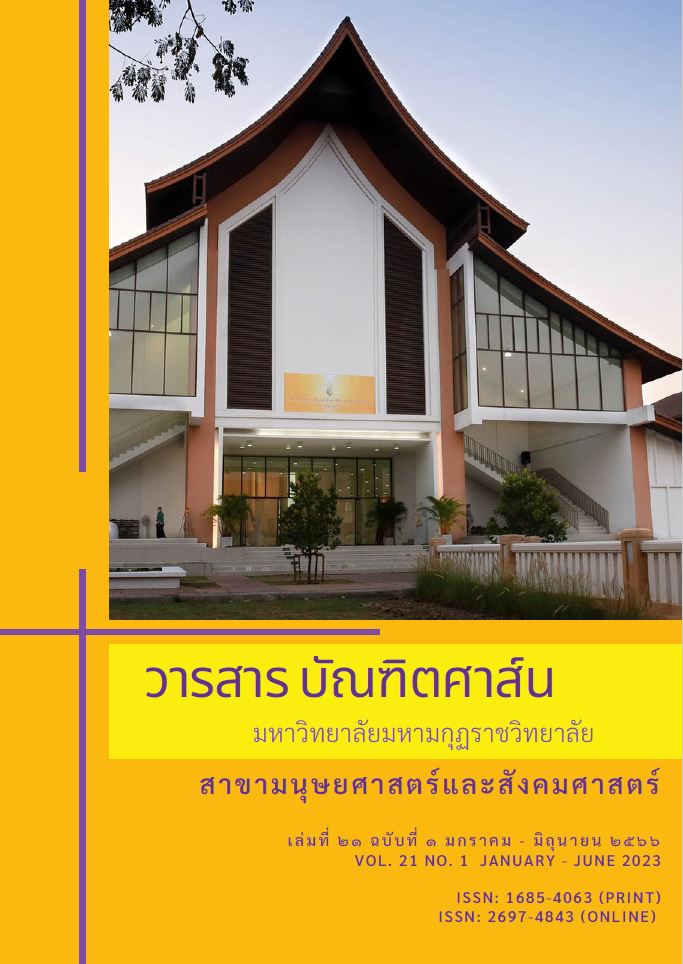การใช้หลักภาวนา 4 ของประชาชนเขตหนองแขม กรุงเทพมหานคร
คำสำคัญ:
หลักภาวนา 4, ประชาชนบทคัดย่อ
วิทยานิพนธ์นี้มีวัตถุประสงค์ ดังนี้ 1) เพื่อศึกษาสภาพการใช้หลักภาวนา 4 ของประชาชนเขตหนองแขม กรุงเทพมหานคร 2) เพื่อเปรียบเทียบการใช้หลักภาวนา 4 ของประชาชนเขตหนองแขม กรุงเทพมหานคร ที่มีเพศ อายุ ระดับการศึกษา อาชีพ และรายได้ต่างกัน 3) เพื่อเสนอแนะแนวทางการส่งเสริมการใช้หลักภาวนา 4 ของประชาชนเขตหนองแขม กรุงเทพมหานคร กลุ่มตัวอย่าง คือ ประชาชนเขตหนองแขม กรุงเทพมหานคร จำนวน 376 คน ซึ่งกำหนดขนาดกลุ่มตัวอย่างโดยใช้ตารางเครซี่และมอร์แกน (Krejcie and Morgan) ใช้วิธีการสุ่มอย่างง่าย (Simple Random Sampling) โดยวิธีการจับฉลาก เครื่องมือที่ใช้ในการวิจัย คือแบบสอบถาม สถิติที่ใช้ในการวิเคราะห์ข้อมูลมี 2 ประเภท ได้แก่ สถิติเชิงพรรณนา คือ ค่าความถี่ ค่าร้อยละ ค่าเฉลี่ยส่วนเบี่ยงเบนมาตรฐาน และ สถิติเชิงอนุมาน คือ การทดสอบค่าที (t-test) และการทดสอบความแปรปรวนแบบทางเดียว (F-test or One-Way ANOVA) โดยใช้การวิเคราะห์ข้อมูลและประมวลผลด้วยคอมพิวเตอร์โปรแกรมสำเร็จรูปทางสถิติ ส่วนข้อเสนอแนะใช้ในการวิเคราะห์เนื้อหา
ผลการวิจัยพบว่า
1) ประชาชนเขตหนองแขม กรุงเทพมหานครมีการใช้หลักภาวนา 4 โดยรวมทั้ง 4 ด้าน อยู่ในระดับมาก เมื่อแยกออกเป็นรายด้านพบว่า อยู่ในระดับมากทุกด้าน โดยเรียงจากมากไปหาน้อยดังนี้1) ด้านศีลภาวนา 2) ด้านกายภาวนา 3) ด้านจิตตภาวนา และ 4) ด้านปัญญาภาวนา ตามลำดับ
2) ผลการเปรียบเทียบ พบว่า ประชาชนเขตหนองแขม กรุงเทพมหานคร ที่มีเพศ อาชีพต่างกัน มีการใช้หลักภาวนา 4 ของประชาชนเขตหนองแขม กรุงเทพมหานคร ไม่แตกต่างกัน แต่ที่มีอายุ รายได้ต่อเดือน และระดับการศึกษาต่างกัน มีการใช้หลักภาวนา 4 ของประชาชนเขตหนองแขม กรุงเทพมหานคร แตกต่างกันอย่างมีนัยสำคัญทางสถิติที่ระดับ .05 จึงทำการวิเคราะห์ความแตกต่างของค่าเฉลี่ยเป็นรายคู่ ด้วยวิธีการของ Scheffe (Post Hoc) พบว่า อายุระหว่าง 18-30 ปี มีการใช้หลักภาวนา 4 แตกต่างกับอายุระหว่าง 31-45 ปี อายุระหว่าง 31-45 ปี มีการใช้หลักภาวนา 4 แตกต่างกับอายุระหว่าง 46-60 ปี และอายุ60 ปีขึ้นไป รายได้ต่อเดือนระหว่าง 8,001-15,000 บาท มีการใช้หลักภาวนา 4 แตกต่างกับรายได้ต่อเดือนระหว่าง 30,001-50,000 บาท รายได้ต่อเดือนระหว่าง 15,001-30,000 บาท มีการใช้หลักภาวนา 4 แตกต่างกับรายได้ต่อเดือนระหว่าง 30,001-50,000 บาท รายได้ต่อเดือนระหว่าง 30,001-50,000 บาท มีการใช้หลักภาวนา 4 แตกต่างกับรายได้ต่อเดือน 50,000 บาทขึ้นไป และระดับการศึกษาประถมศึกษา และมัธยมศึกษา มีการใช้หลักภาวนา 4 แตกต่างกับระดับการศึกษาปริญญาตรี และระดับการศึกษาสูงกว่าปริญญาตรี อย่างมีนัยสำคัญทางสถิติที่ระดับ .05
3) ประชาชนเขตหนองแขม กรุงเทพมหานคร ได้ให้ข้อเสนอแนะเกี่ยวกับการส่งเสริมการใช้หลักภาวนา 4 ของประชาชนเขตหนองแขม กรุงเทพมหานคร มีข้อเสนอแนะดังนี้ 1) ด้านกายภาวนา อยู่ร่วมกับสิ่งแวดล้อมอย่างรู้จักคุณค่า ปรับตนเองกับสิ่งแวดล้อมอย่างสมดุล ดูแลรักษาสุขภาพของตนให้ดี 2) ด้านศีลภาวนา ฝึกฝนตนเองและปฏิบัติตามระเบียบวินัย รักษากาย วาจา ให้เรียบร้อยเพื่อการอยู่ร่วมกันในสังคมอย่างมีความสุข ไม่ทำให้ผู้อื่นเดือดร้อน 3) ด้านจิตตภาวนา ฝึกฝนให้ตนมีจิตใจที่อิสระเบิกบานผ่องใส รู้จักการเอื้อเฟื้อเผื่อแผ่ ความเมตตา กรุณา และ 4) ด้านปัญญาภาวนา ใช้เหตุและผลในการพิจารณาแก้ไขปัญหา สามารถเข้าใจสิ่งทั้งหลายได้อย่างถูกต้อง และแก้ไขได้ด้วยสติปัญญา มองเห็นสิ่งทั้งหลายเกิดขึ้นตามความเป็นจริง
เอกสารอ้างอิง
มหามกุฏราชวิทยาลัยมูลนิธิ. พระไตรปิฎกภาษาไทย ฉบับมหามกุฏราชวิทยาลัย พิมพ์เนื่องใน วโรกาสครบ 200 ปี แห่งราชวงศ์จักรี กรุงรัตนโกสินทร์ พุทธศักราช 2525. กรุงเทพมหานคร : โรงพิมพ์มหามกุฏราชวิทยาลัย, 2552.
สมเด็จพระญาณสังวร สมเด็จพระสังฆราช สกลมหาสังฆปริณายก (เจริญ สุวฑฺฒโน). ชีวิตนี้น้อยนัก. กรุงเทพมหานคร : อุษาการพิมพ์, 2553.
สมเด็จพระพุทธโฆษาจารย์ (ป.อ.ปยุตฺโต). พจนานุกรมพุทธศาสน์ ฉบับประมวลศัพท์. กรุงเทพมหานคร : สำนักพิมพ์ผลิธัมม์ ในเครือ บริษัท สำนักพิมพ์เพ็ทแอนด์โฮม จำกัด, 2561.
จ่าสิบโทอัครนันท์ เจริญกิจจารัตน์. การพัฒนาทรัพยากรมนุษย์ ตามหลักภาวนา 4 ของกองพันทหารช่างที่ 4 จังหวัดนครสวรรค์. วิทยานิพนธ์พุทธศาสตรมหาบัณฑิต. บัณฑิตวิทยาลัย : มหาวิทยาลัยมหาจุฬาลงกรณราชวิทยาลัย, 2556.
พระชัยณรงค์ วิทิโต (ร่องมะรุด). การประยุกต์หลักศีล 5 เพื่อพัฒนาพฤติกรรมของบุคคลในสังคม. วิทยานิพนธ์พุทธศาสตรมหาบัณฑิต. บัณฑิตวิทยาลัย : มหาวิทยาลัยมหาจุฬาลงกรณ ราชวิทยาลัย, 2555.
พระพุทธินันทน์ บุญเรือง. การพัฒนาทรัพยากรมนุษย์แบบยั่งยืนตามหลักพระพุทธศาสนา. วิทยานิพนธ์พุทธศาสตรมหาบัณฑิต. สาขาวิชารัฐประศาสนศาสตร์. บัณฑิตวิทยาลัย : มหาวิทยาลัยมหาจุฬาลงกรณ์ราชวิทยาลัย, 2551.
พลอาสาสมัคร อนุกุล บุญรักษา. การพัฒนาทรัพยากรมนุษย์ตามหลักภาวนา 4 ของกองบัญชาการมณฑลทหารบกที่ 31. วิทยานิพนธ์พุทธศาสนศาสตรมหาบัณฑิต. บัณฑิตวิทยาลัย : มหาวิทยาลัยมหาจุฬาลงกรณราชวิทยาลัย, 2554.
พัชรินทร์ แจ้งอิ่ม. การพัฒนาคุณภาพชีวิตการทำงานของข้าราชการครู ตรมหลักภาวนา 4 ในเขตอำเภอท่าตะโก จังหวัดนครสวรรค์. วิทยานิพนธ์พุทธศาสนศาสตรมหาบัณฑิต. บัณฑิตวิทยาลัย : มหาวิทยาลัยจุฬาลงกรณราชวิทยาลัย, 2556.
ดาวน์โหลด
เผยแพร่แล้ว
รูปแบบการอ้างอิง
ฉบับ
ประเภทบทความ
สัญญาอนุญาต
ลิขสิทธิ์ (c) 2023 มหาวิทยาลัยมหามกุฏราชวิทยาลัย

อนุญาตภายใต้เงื่อนไข Creative Commons Attribution-NonCommercial-NoDerivatives 4.0 International License.
บทความวิชาการและบทความวิจัยในวารสารฉบับนี้ถือเป็นความรับผิดชอบของผู้เขียนเท่านั้น บทความที่ได้รับการตีพิมพ์ในวารสารบัณฑิตศาส์น ถือเป็นลิขสิทธิ์ของมหาวิทยาลัยมหามกุฏราชวิทยาลัย ตามพระราชบัญญัติลิขสิทธิ์



